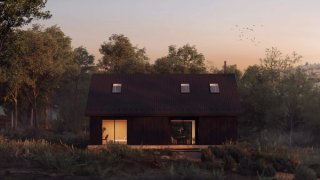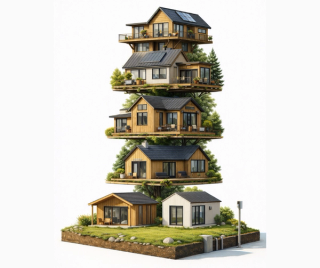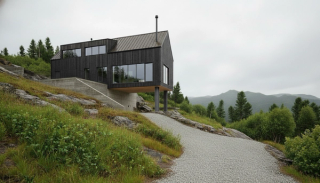Be Your Own Developer

Last week in Jackson Hole, the Federal Reserve Bank of Kansas City held their annual conference.
Federal Reserve Chairman Jerome Powell addressed the crowd.
"The message is the same," he said. "It is the Fed’s job to bring inflation down to our 2 percent [per annum] goal, and we will do so." The tools available to Powell?
Well, really just one: adjusting the interest rate to decelerate (read: rate hike) or accelerate (read: rate drop) the pace of borrowing across the economy. Rates go up, the economy cools down. Rates go down, the economy heats up. Today, it’s still too hot, even with the cost of borrowing being jacked up for 2+ years.
All the data suggests some additional rate hikes may be on the horizon. It is likely that the Federal Reserve will keep rates for longer than was expected. We'll see how that promise holds up as the 2024 election draws closer, but for now Powell is committed to cooling things down.
For Boomers who may own their homes outright and are shifting into full-time retirement and relying on dividends from their fixed-income portfolios? Powell's speech was great news. High interest rates mean high yields. It means better guaranteed returns on lower-risk bond funds. Perfect for the later seasons of life.
How about for younger generations looking to purchase a home? Not great. The Fed’s actions, on the surface, are a total wet blanket. For everyday consumers, the Fed’s rate hikes and deflationary measures are most visible through home mortgage rates. Today’s 30-year fixed rate is +/- 7.5%. This time last year, the average was 5.25%. Two years ago? 3%. A $500,000 loan two years ago cost $1,500 / month. Today, it’s $3,750. So, home prices must have gone down, right? RIGHT?!
Not really.
Low inventory, heavy competition and participation from private equity firms has buoyed home prices, keeping the cost of resales steady.
But, people still need houses - both as primary homes and as more flexible investment assets - and renting forever just isn’t the answer (especially as landlords increase prices to keep up with inflation).
So, what do you do to about housing while the Fed is fighting inflation?
I’m extremely biased, but developing your own property sounds like the most attractive route to getting the house you actually want, at a price point that’s more reasonable.
What if you could design and build what you want for less than the cost of purchasing existing inventory, and have no unexpected renovation costs? And you can use the construction period to wait out some of Jerome Powell’s efforts? And come out the other end with a high-value property, right as mortgage rates start to fall?
For the first time in my life, the rates on residential construction lending is on par or lower than traditional 30-year fixed loans. That’s a planetary re-alignment. Today, interest-only construction loans will span for 12 to 18-months before flipping to a permanent loan. That construction loan will run just south of 7%, less than today’s 30-year fixed. Upon completion of your new home, the construction loan will be replaced by a 30-year fixed loan. The interest rate should be lower than today's prevailing rates at the time of completion.
When you purchase a home, you’ve outsourced time and risk to the developer. They make that up by significantly upselling the cost of construction. The developer put up $500k to build, 12 months of design / permitting / construction time, and so they want $800k in exchange for their effort.
But what if you put out the effort? With the help of someone taking you step-by-step through the process. Someone like…oh…I don’t know…HUTS?
When you’re your own developer, the math changes. You absorb some more risk. It takes some more time. But, you’re paying for the cost of construction, not the cost of the construction plus the developer’s 50%+ markup. And, today, you’re taking on a construction loan that’s less expensive than a regular mortgage. Oh, and it’s a house design you actually want, not just whatever’s available.
We get it. You’re not a home designer, architect, builder or developer. You have ideas about your house, but don’t fully know what you don’t know about building it. That’s where HUTS comes in.
We help you through each step of the design and building process. In today's environment it might be the best way to get the house you want at a price that works.


